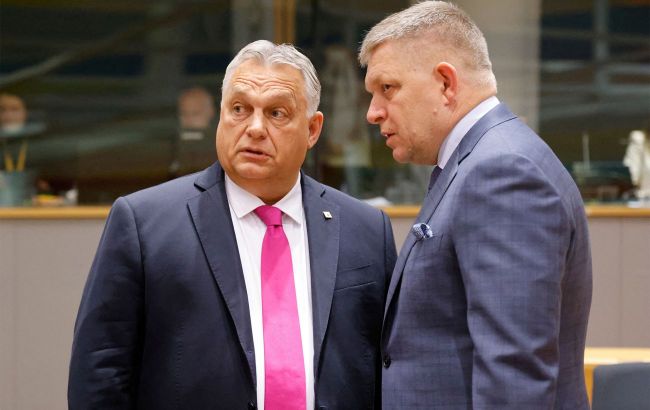Why Hungary and Slovakia suddenly supported new EU sanctions against Russia: Media explains
 Photo: Hungarian Prime Minister Viktor Orbán and Slovak Prime Minister Robert Fico (Getty Images)
Photo: Hungarian Prime Minister Viktor Orbán and Slovak Prime Minister Robert Fico (Getty Images)
EU ambassadors have agreed on the 17th package of economic sanctions against Russia. The restrictions were suddenly supported by Hungary and Slovakia, which often blocked the adoption of sanctions, Euractiv reports.
The new package includes bans on exports of chemicals used in weapons production, trade restrictions on dozens of companies involved in sanctions circumvention, and a list of nearly 200 oil tankers from Russia's shadow fleet.
European diplomats told the agency that Hungary and Slovakia, which are known for their pro-Russian views and remain heavily dependent on Russian energy imports, supported the package because of its relative weakness.
Meanwhile, Sweden and Finland have said that the sanctions package must be approved by their parliaments. Both countries are expected to approve the restrictions and fully support further sanctions against Moscow.
The Swedish and Lithuanian finance ministers have already called for an 18th package of sanctions against Moscow after Russia ignored the May 12 deadline for a 30-day ceasefire.
Sanctions against Russia
The 16th package was adopted by the EU on the eve of the third anniversary of Russia's full-scale invasion of Ukraine. On Wednesday, May 14, EU ambassadors agreed on a new package of sanctions. This happened against the backdrop of possible talks between Ukrainian President Volodymyr Zelenskyy and Russia's Vladimir Putin in Türkiye.
France and Germany warned Russia of new tough sanctions if Moscow does not agree to a ceasefire. The French Foreign Minister is going to discuss new sanctions against Russia with US Senator Lindsey Graham, which could strangle the Russian economy once and for all.
Earlier, Graham proposed a bill to strengthen US sanctions against Moscow if it blocks the path to ending the war. It provides for 500% duties on imports from countries that buy Russian oil, oil products, natural gas, or uranium.

